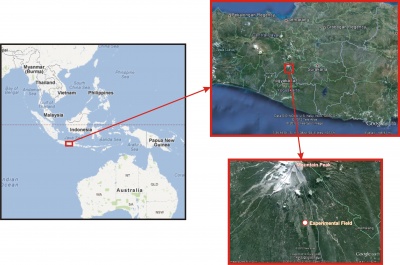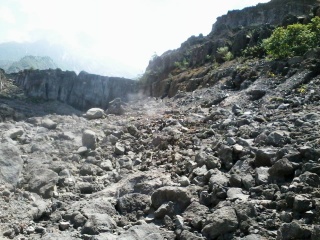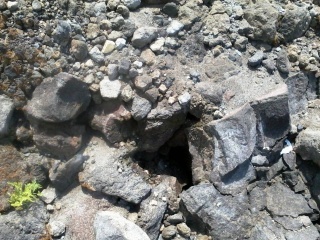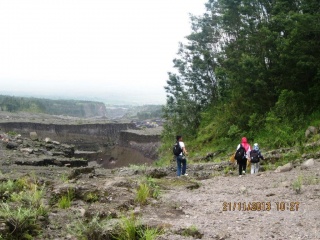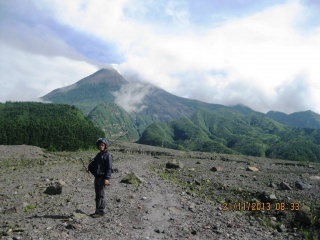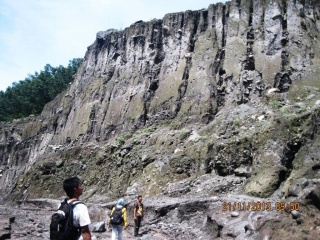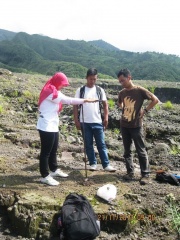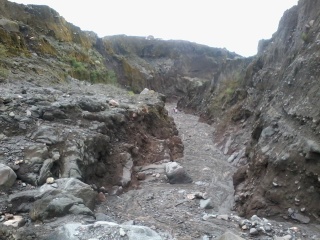Biorecovery of Volcanic Soil
<- back to main page of HackteriaLab 2014 - Yogyakarta
Contents
Merapi Volcano
Related Projects
Employing Wide Spectrum Legume for Improving The Biodiversity of Legume Nodulating Bacteria in Soil (Department of Microbiology, Faculty of Agriculture, UGM)
Objectives:
To develop a method for improving the Legume Nodulating Bacteria (LNB) biodiversity in soil.
Introduction :
Establishment and persistence of rhizobia in soil is adversely affected by both biotic and abiotic factors. Biotic factors include predators and organisms producing chemical substances which are deterimental to survival of rhizobia. Abiotic factors include primarily various stresses arising out of environtment, heavy metals, pesticides, temperature, soil moistures, etc. Temperature and soil moisture content are abiotic factors that strongly influence survival of LNB (Boonkerd and Weaver, 1981). Major increase of soil temperature decreasing soil moisture content, Bushby and Marshall (1976) and Antheunissen and Arkestein-Dijksman (1979) observed a rapid decline and low survival of rhizobia when drying was rapid. Soil temperature change could be caused by an environtmental disturbance, such as: Forest burning, climate change, and volcanic eruptions.
There was wide-spread devastation following the 2010 eruption of Mount Merapi in Yogyakarta, Indonesia. The explosive eruption producing clouds of hot ash and other volcanic material which caused a rapid drying to the soils around the volcano and covering the soil at about 50 cm thick, creates nutrient poor volcanic surfaces. Previous research sudied the biodiversity of LNB in 3 (three) agroecosystem affected by Mount Merapi eruption shows that LNB biodiversity levels were generally decrease. Therefore, it needs an effort to restore the biodiversity of LNB for helping further plant growth in the destrupted soils.
Several methodes could be carries out to increase the biodiversity of LNB in the distrupted soil: Inoculating LNB in the soil, giving apropriate environmetal condition for LNB growth (temperature, humidity, pH, and nutrient), and cultivating wide spectrum leguminous plants. Many tropical legumes can form effective nodules with a broad spectrum of rhizobial common to tropical soils were native legume are presents. Cultivating wide spectrum leguminous plants could be an effective method for improving the biodiversity of LNB in soil. The aim of this research is to develop an apropriate and feasibe method to restore LNB biodiversity in the soil affected by mount Merapi eruptions, using wide spectrum leguminous plants.
Study sites :
Cangkringan, Sleman, Yogyakarta, Indonesia.
The overall research activities :
1. Selection and observation of experimental field
2. Cultivation of wide spectrum leguminous plants
3. Sample collections at the end of the first, fourth, and eight month after initial sowing.
4. Identification the LNB biodiversity by means of molecular technique detection
The annual activities :
First Year : 2012
1. Procuring main research equipment and consumables
2. Preliminary survey and establishing sampling sites
3. Initial field sampling and laboratory analysis
4. Wide spectrum leguminous plants cultivation
Second year : 2013
1. Regular field sampling and laboratory analysis at the end of fourth month after sowing
2. Regular field sampling and laboratory analysis at the end of eight month after sowing
Third year : 2014
1. Regular field sampling and laboratory analysis at the end of twelve month after sowing
2. Conducting a workshop on research findings
Outcomes
1. Better understanding of the volcanic eruption effect to the Legume Nodulating Bacteria (LNB) biodiversity in the soil.
2. To develop a method for improving the Legume Nodulating Bacteria (LNB) biodiversity in soil affected by the volcanic eruption.
3. To restore the plant microbe symbiosis and increase soil fertility so that the original crop can be grown successfully again by the farmers.
